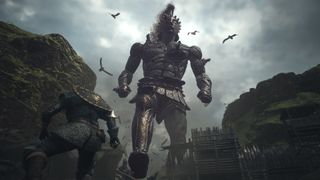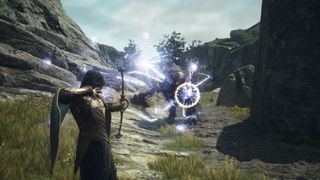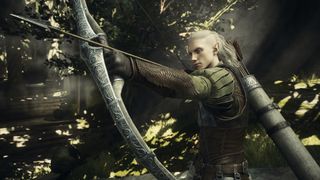
This fight has spiraled rapidly out of control. I thought I was taking on one stone golem, but now two more have come stumbling out of the foothills. At one point during the afternoon, a griffin swooped down to join the fray, permanently killing one of my pawns before my fire arrows could finish it off. I say 'the afternoon' because this battle eventually lasts for almost an entire day/night cycle. When the griffin falls, my fresh kill is bathed in the light of the evening's golden hour. When my second golem falls, it's by torchlight, and the first signs of dawn are creeping over the mountains by the time the fight is finally finished.
It's a chaotic battle that spreads over almost an entire hillside, and sees me using my magic archer's resurrection arrows on my suffering pawns dozens of times. It's also exactly the kind of thing that drew me to Dragon's Dogma 2. As someone who never played the original game, it was stories of the open-ended nature of its combat that excited me about the sequel. As first a magic archer with a quiver of homing arrows, and then a frantic, spear-wielding fighter, Dragon's Dogma 2 delivered on its promised freedom in spades.
Pawn shop

In my two-hour playthrough, the critical path was a little more than an idea; even if I'd wanted to follow a quest, the world was humming with so much life that in the time I had I don't know if I ever would have managed to complete one. A couple of NPCs wandered up to me with mysterious tales they wanted me to investigate, but they were swiftly waved away in favor of my own adventures.
In fairness, those adventures didn't take me all that far; my time with the magical archer was derailed by my royal rumble with the golems and gryphon; and with the spearman, I stumbled across a group of NPCs sparring with a dragon at the bottom of a ravine. Tasting glory, my party joined the fray, and while we were eventually slain, the chaos of that nine-way battle meant that it too lasted well into the night, the face of the one remaining character fighting by my side illuminated by dragon fire.
The sheer number of moving parts in these fights makes Dragon's Dogma 2 feel like a technical marvel. Between me and my three pawns, multiple massive enemies, and the smaller opportunists that jumped into each fray to add to the chaos, the game is managing an awful lot at once, with barely a hitch. Fights play out in a variety of complicated ways – one golem had its weak spot on the base of its foot, so I could only deal any real damage once it was staggered, teetering chaotically on one foot. Another, however, must have thrown its weak point at a party member at some point, because I eventually found it a few meters from the rest of the fight, finally allowing me to finish the battle.
But in the midst of that technical prowess is a distinctly retro-feeling game. Capcom has been keen to highlight the extent to which this sequel is the follow-up that the creators have always wanted to make, not a reboot inherently designed to pull in a new generation of players. That intent is written across the game from the first moment I start it; from the menus and UI to the warren-like settlements and even the color palette, you can feel the influence of Japanese RPGs of a bygone era. That deliberate aesthetic is by far the most dated aspect of Dragon's Dogma 2, but the mark of the PS3-era games that shaped this one is still keenly felt.
Why have you Forspoken me?
I can also feel the mark of another Japanese RPG, but it's one that I'm hesitant to discuss. To spit it out, I genuinely enjoyed Forspoken, last year's much-maligned release that essentially sunk its studio after a reported $100 million investment. Looking beyond the muddy visuals and cringe storytelling, I found a freeform, delightfully improvisational combat system that meshed excellently with a world that thrived on open-ended exploration.
Sign up to the GamesRadar+ Newsletter
Weekly digests, tales from the communities you love, and more
Particularly with the Archer, I felt the same pull, the same sense that combat was about your manipulation of the battlefield more than direct mastery of the systems. That mastery was there – in the delicate aim of those fire arrows, or a clutch cast of the spearman's shield spell – but careful management of your pawns or a deliberate redirection of even a towering enemy is far more likely to bring success than a simple series of bow or spear strikes. I'm aware this might not seem like the most complimentary comparison, but Forspoken drew on similar ideas so much that I'm just as interested to go back to Dragon's Dogma 1 to see how it pertains to Forspoken, as how it pertains to its successor.
In turn, that points me to some of the weirder classes that Dragon's Dogma 2 will offer. In this playtest, I was limited to these two, but that idea of controlling a battlefield rather than simply rampaging over it has me thinking about the Trickster class – a spin on the traditional mage that's intended to lead monsters to their doom by fooling them into charging over cliffs. The two characters I played let me touch the surface of a whole new way of playing RPGs, and I can't wait to see how the rest of the game lets me dig into those ideas further.

I'm GamesRadar's news editor, working with the team to deliver breaking news from across the industry. I started my journalistic career while getting my degree in English Literature at the University of Warwick, where I also worked as Games Editor on the student newspaper, The Boar. Since then, I've run the news sections at PCGamesN and Kotaku UK, and also regularly contributed to PC Gamer. As you might be able to tell, PC is my platform of choice, so you can regularly find me playing League of Legends or Steam's latest indie hit.
Most Popular




